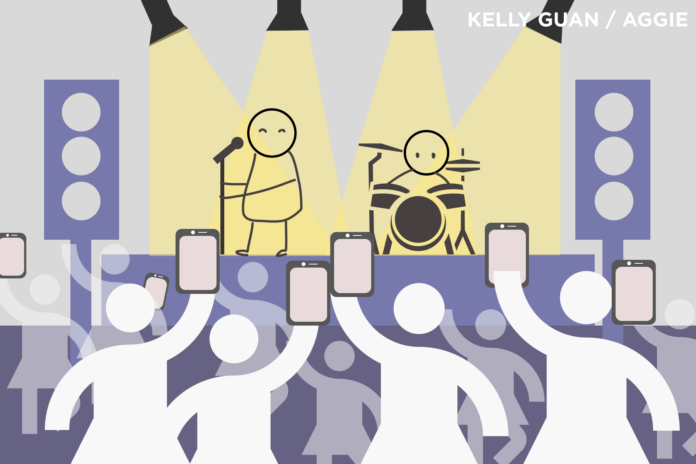Students and experts share their thoughts about social norms and rules for live shows
By SABRINA FIGUEROA — features@theaggie.org
After the COVID-19 pandemic shut concerts down, live music has finally made its full comeback with several major artists including Beyoncé, Taylor Swift and Harry Styles touring the world again. However, people are beginning to notice that something about concerts has changed.
In the past year, fans at concerts have been throwing objects — or “gifts” — on the stage, sometimes hitting the performers. For example, singer-songwriter Bebe Rexha was hit in the head by a phone last July and had to be rushed off stage to the hospital. Other times, these alleged “gifts” simply overstep the boundaries the artists have with their supporters, such as when a fan at Pink’s concert threw their mother’s ashes on stage.
The odd behavior doesn’t stop there. Sources have reported excessive shoving inside and outside pit areas, people constantly obstructing others’ views by trying to film the artists and repeated disrespectful shouting at the performers. Most recently, this phenomenon was seen at multiple Mitski concerts where fans yelled the phrase, “Mother is mothering,” even after the singer expressed discomfort with it.
Mallory Erickson, a third-year English major, shared another incident she experienced with other concertgoers.
“I went to a concert back in November that was in Oakland, and I just remember getting weird looks for singing along to the songs and dancing,” Erickson said. “I was so caught up in trying not to be so loud or distracting that it made [the concert experience] kind of unrewarding. It felt so competitive when it’s not supposed to be.”
People are beginning to mark these shifts in behaviors as the “death of concert etiquette.” Concert etiquette is a set of unwritten rules and norms that are expected of people attending musical performances to ensure a safe and comfortable environment.
Frequent concertgoers and experts have tried to explain the etiquette’s decline, suggesting that it may have been due to the COVID-19 pandemic.
Jessica Preciado, a first-year evolution, ecology and biodiversity major, offered her experiences at post-pandemic concerts.
“[After the pandemic], something I have noticed — and not just at concerts but at, like, grocery stores too — is that people don’t really mind for the space of others or they feel entitled to things,” Preciado said. “It’s like we forgot how to socialize with people we don’t know.”
Lucy Bennett, a lecturer at Cardiff University with expertise in the relationships between musicians and fans, explained that the pandemic shutdowns deprived younger audiences of properly learning the “correct” way to act at concerts.
“It seems that, for some individuals, the notion of being there at a gig equates with physical participation, whether that is throwing something or screaming or engaging in a ‘stampede’ in a crowd,” Bennett said. “There is a strong re-centering here of a live, physical event — an almost frantic grasping of a live moment by a crowd that has not been able to attend live gigs due to lockdown.”
It is also possible that the decline of concert etiquette may be a result of the overuse of social media, such as TikTok. Young audiences have grown accustomed to seeing videos of spectacles reach a massive like count or following simply for the content being funny or entertaining, and now they want to do the same thing.
“People always say, ‘You can get famous on TikTok for anything, it’s so easy to get views and followers!’ and I feel like people try to do and record the craziest or funniest things at concerts to get the attention of others and go viral; especially since now you can become an influencer and get paid to post on social media,” Preciado said.
Bennett expressed the same sentiment and added that it has to do with both social media and parasocial relationships between the artists and their fanbases. These relationships are one-sided, where closeness is falsely believed to exist between a fan and a celebrity.
“Some fans experience a parasocial relationship — a sense of knowing their favorite musicians — even when they are one amongst potentially millions that follow the artist. This is then where a live concert can play a strong role,” Bennett said. “The artist is physically there in front of the audience, and there is a visible chance for a fan to be noticed, to attempt to make themselves more distinct in a sea of other fans, if only for a moment — yet a moment that can be immortalized on social media and shared with many fans online.”
Erickson also shared some unwritten rules she follows at concerts and thinks others should, too.
“To be honest, I would say to just be nice to the people around you and also follow basic hygiene routines,” Erickson said. “It’ll make you and others enjoy the experience so much more.”
Preciado listed other examples of concert etiquette
“For one, I think people should be more conscious about shoving because it could create a dangerous situation,” Preciado said. “I also think people should be careful about smoking in indoor venues just because you never know who could be in the crowd [such as] immunocompromised people or asthmatics.”
Regardless of whether you agree or not, concert etiquette has been found to be an important part of fan culture and creating an enjoyable environment at a live show. It can help foster a sense of community between fans and help with safety.
“[Recently], it’s been brought to light how a lot of people will faint or fall down because of how rough people are in the pits, ending up with them getting trampled and even dying,” Erickson said. “I think we need these rules to remind us to be careful and mindful of others.”
Written by: Sabrina Figueroa — features@theaggie.org





